Putin and Trump’s relationship has soured – but behind the posturing, a Ukraine deal is still possible
10 hours ago
 Steve RosenbergRussia Editor•@BBCSteveR
Steve RosenbergRussia Editor•@BBCSteveR

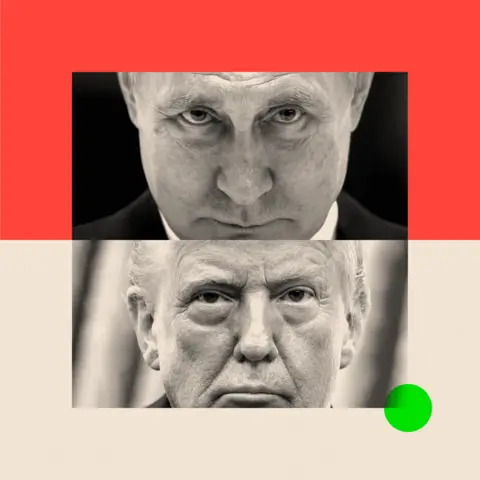 BBC
BBCHas the relationship between Donald Trump and Vladimir Putin gone off the rails? A popular Russian newspaper thinks so. It turned to trains to illustrate the current state of US-Russian ties.
“A head-on collision seems unavoidable,” declared tabloid Moskovsky Komsomolets recently.
“The Trump locomotive and the Putin locomotive are speeding towards each other.
“And neither is about to turn off or stop and reverse.”
For the ‘Putin locomotive’, it’s full steam ahead, with the so-called ‘Special Military Operation’: Russia’s war in Ukraine. The Kremlin leader has shown no desire to end hostilities and declare a long-term ceasefire.

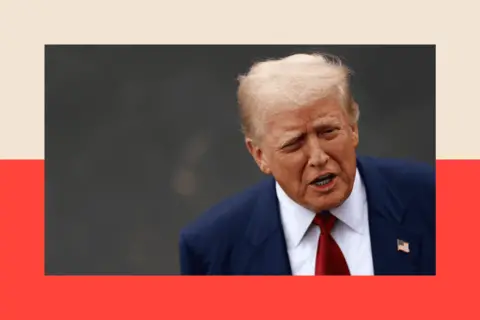 WILL OLIVER/EPA/Shutterstock
WILL OLIVER/EPA/ShutterstockMeanwhile, the ‘Trump locomotive’ has been accelerating efforts to pressure Moscow into ending the fighting: announcing deadlines, ultimatums, threats of additional sanctions against Russia and hefty tariffs on Russia’s trading partners, like India and China.
Add to all of that the two US nuclear submarines which President Trump claims he’s repositioned closer to Russia.
When you switch from talking about locomotives to nuclear subs, you know things are serious.
But does that mean the White House is really on a “collision course” with the Kremlin over Ukraine?
Or is a visit to Moscow this week by Donald Trump’s special envoy, Steve Witkoff, a sign that for all the posturing, a deal between Russia and America to end the fighting is still possible?
A warm start following Trump’s return
In the early weeks of the second Trump presidency, Moscow and Washington appeared well on track to reboot their bilateral relations.
No hint of a head-on collision. Far from it. At times it seemed as if Vladimir Putin and Donald Trump were in the same carriage, moving in the same direction. In February the United States sided with Russia at the United Nations, opposing a European-drafted resolution that had condemned Russia’s “aggression” in Ukraine.
In a telephone call that month the two presidents talked about visiting each other’s countries. It felt like a Putin-Trump summit could happen any day.

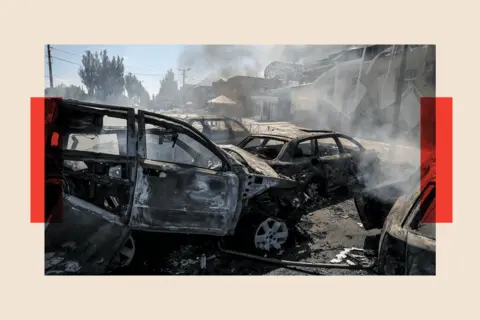 PRESS SERVICE OF THE 24 MECHANIZED BRIGADE HANDOUT/EPA/Shutterstock
PRESS SERVICE OF THE 24 MECHANIZED BRIGADE HANDOUT/EPA/ShutterstockMeanwhile the Trump administration was exerting pressure on Kyiv, not on Moscow, and picking fights with traditional US allies, such as Canada and Denmark. In speeches and TV interviews, American officials were fiercely critical of Nato and of European leaders.
All of this was music to the Kremlin’s ears.
“America now has more in common with Russia than Washington does with Brussels or with Kyiv,” political scientist Konstantin Blokhin from the Russian Academy of Sciences Centre for Security Studies told the Izvestia newspaper in March.
The following month the same newspaper was crowing:
“The Trumpists are revolutionaries. They are wreckers of the system. They can only be supported in this. The unity of the West is no more. Geo-politically it is no longer an alliance. Trumpism has destroyed the Transatlantic consensus confidently and quickly.”

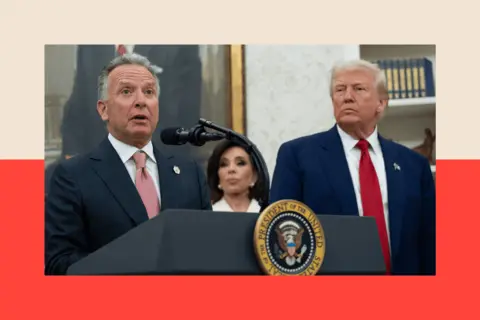 Chris Kleponis – Pool via CNP/POOL/EPA-EFE/Shutterstock
Chris Kleponis – Pool via CNP/POOL/EPA-EFE/ShutterstockMeanwhile Donald Trump’s envoy, Steve Witkoff, had become a regular visitor to Russia. He made four trips here in just over two months, spending hours in talks with Vladimir Putin. After one meeting, the Kremlin leader presented him with a portrait of Donald Trump to take back to the White House.
President Trump was said to be “clearly touched” by the gesture.
But President Trump was looking for more than just a painting from Moscow. He wanted President Putin to sign up to an unconditional comprehensive ceasefire in Ukraine.
Trump’s increasing frustration
Confident that Russia holds the initiative now on the battlefield, Vladimir Putin has been reluctant to stop fighting, despite his claim that Moscow is committed to a diplomatic solution.
Which is why Donald Trump has grown increasingly frustrated with the Kremlin.
In recent weeks he has condemned Russia’s relentless attacks on Ukrainian cities as “disgusting”, “disgraceful” and accused President Putin of talking “a lot of bullshit” on Ukraine.

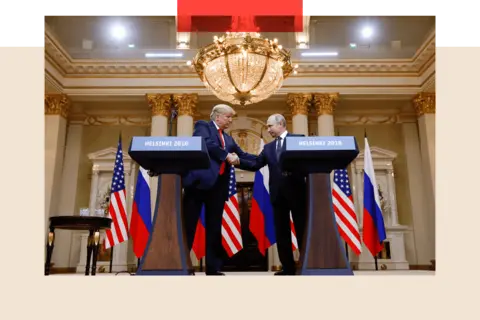 REUTERS/Kevin Lamarque
REUTERS/Kevin LamarqueLast month, Donald Trump announced a 50-day ultimatum to President Putin to end the war, threatening sanctions and tariffs. He subsequently reduced that to ten days. The deadline is due to expire at the end of this week. So far, there is no sign that Vladimir Putin will yield to pressure from Washington.
Then again, how much pressure does Vladimir Putin really feel under?
“Because Donald Trump has changed so many deadlines and he’s twisted one way or another, I don’t think Putin takes him seriously,” believes Nina Khrushcheva, a professor of international affairs at The New School, a university in New York City.

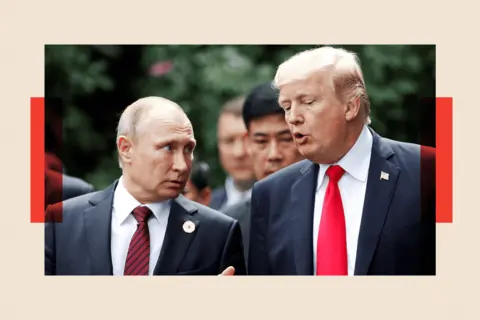 REUTERS/Jorge Silva
REUTERS/Jorge Silva“Putin’s going to fight for as long as he can, or, unless Ukraine says, ‘We’re tired, we are willing to accept your conditions.’
“I think Putin sits there in the Kremlin and thinks that he’s fulfilling the dreams of the Russian tsars, and then the general secretaries such as Joseph Stalin, in showing the West that Russia should not be treated with disrespect.”
A deal is still possible
From the picture I’ve painted so far it may look as if a head-on collision between the Putin and Trump locomotives is inevitable.
Not necessarily.
Donald Trump sees himself as a great dealmaker and, from the look of things, he hasn’t given up trying to secure one with Vladimir Putin.
Steve Witkoff is due back in Russia this week for talks with the Kremlin leader. We don’t know what kind of an offer he may bring with him. But some commentators in Moscow predict there will be more carrot than stick. It did not go unnoticed that on Sunday President Trump said Russia “seem to be pretty good at avoiding sanctions”.

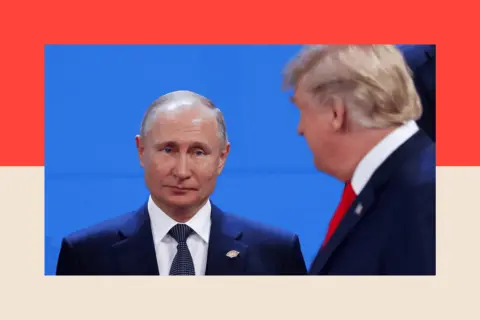 REUTERS/Marcos Brindicci
REUTERS/Marcos BrindicciOn Monday, Ivan Loshkarev, associate professor of political theory at MGIMO University, Moscow, told Izvestia that to facilitate dialogue, Mr Witkoff may present “advantageous offers of cooperation [to Russia] that would open up after a deal on Ukraine”.
Might that be enough to persuade the Kremlin to make peace after three-and-a-half years of war?
There’s no guarantee.
After all, so far in Ukraine Vladimir Putin hasn’t budged from his maximalist demands on territory, Ukraine’s neutrality and the future size of the Ukrainian army.
Donald Trump wants a deal. Vladimir Putin wants victory.
More from InDepth
BBC InDepth is the home on the website and app for the best analysis, with fresh perspectives that challenge assumptions and deep reporting on the biggest issues of the day. And we showcase thought-provoking content from across BBC Sounds and iPlayer too. You can send us your feedback on the InDepth section by clicking on the button below.